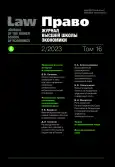A New Concept of Employment and the Development of Labor Relations in the Digital Age
- Authors: Zakalyuzhnaya N.1
-
Affiliations:
- National Research University Higher School of Economics
- Issue: Vol 16, No 2 (2023)
- Pages: 139-164
- Section: Russian Law: Condition, Perspectives, Commentaries
- URL: https://journal-vniispk.ru/2072-8166/article/view/318243
- DOI: https://doi.org/10.17323/2072-8166.2023.2.139.164
- ID: 318243
Cite item
Full Text
Abstract
In modern geopolitical and economic realities the role of labor law and its functionality are radically changing. More over the relations are formed that are built according to the certain rules but there may be no legal regulation; among them are: atypical employment including attracted labor, gig employment, self-employment, spot employment, etc. At the same time, the role of integration associations in the field of labor and transnational corporations is changing. In addition, digitalization in labor law is reaching a qualitatively new level today. Therefore the article offers current research directions of these and other relations within the framework of new challenges for labor law in the digital age. In December 2022 the State Duma held a meeting of the working group on the draft of new Federal Law On Employment in the Russian Federation. However, the draft raised a lot of questions and was completely revised. But while the draft has not passed yet into the status of a law, additional changes and clarifications are possible, which makes the proposed topic even more relevant. Therefore, an important vector of today is the need to develop a concept of a new type of employment and improvement of legislation on employment of the population. In addition, robotization in the field of labor relations is reflected not only in the positive use of industrial robots capable of performing the same type of repetitive tasks with great efficiency, but also carries various kinds of risks. Employment of the population is also threatened by increasing use of artificial intelligence. Digitalization in the field of labor relations logically entails atypical forms of using already classical institutions, for example, new opportunities are opening up in the application of the institute of social partnership, namely, in the activities of sector trade unions in the aspect of regulating collective labor relations, which will also be discussed in this paper. Also, in the research are analyzed legislative changes concerning electronic interaction between an employee and an employer within the framework of performing remote work.
About the authors
Natalia Zakalyuzhnaya
National Research University Higher School of Economics
Email: noreply@hse.ru
ORCID iD: 0000-0002-8135-1704
Doctor of Sciences (Law), Professor
References
- Andreeva L. Yu., Dzhemaev O.T. (2017) The influence of digital economy on forming new trends in the Russian labor market. Gosudarstvennoe i munitchepalnoe upravlenie=State and Municipal Administration, no. 3, pp. 25-32 (in Russ.)
- Belozerova K.I. (2022) The influence of digital technologies on labor function of an employee and other related terms of employment contract. Actualnie problemy rossyiskogo prava=Issues of Russian Law, no. 7, pp. 91-98 (in Russ.) DOI:https://doi.org/10.17803/1994-1471.2022.140.7.091-098
- Deltsova N.V., Kot M.K. (2019) Legal aspects of the application of information technologies in the field of labor and employment. Vestnik Volzhskogo univesiteta imeni Tatischeva=Bulletin of V.N. Tatishchev Volga University, vol. 1, no. 2, pp. 106113 (in Russ.)
- Dzhioev S.H. (2006) Legal issues of promoting employment. Moscow: Prospekt, 288 p. (in Russ.)
- Eremin V.V. (2019) Robotization and employment: a deferred threat. Mir novoi economiki=World of the New Economy, no. 1, pp. 25-35 (in Russ) DOI:https://doi.org/10.26794/2220-6469-2019-13-1-25-35
- Filipova I.A. (2020) Labor law: challenges of the information society. Pravo. Zhurnal Vysshey shkoly economiki=Law. Journal of the Higher School of Economics, no. 2, pp. 162-182 (in Russ.) DOI:https://doi.org/10.17323/2072-8166.2020.2.162.182
- Khubulova M.I. (2022) Artificial intelligence in the sphere of labor. Trudovoe pravo v Rossii i za rubezhom=Labor Law in Russia and Abroad, no. 3, pp. 45-47 (in Russ.)
- Kostoeva V. (2020) Better call Saul: will technology be able to replace a lawyer? Available at: URL:https://www.forbes.ru/brandvoice/ipquorum/391127-luchshe-zvonite-solu-smogut-li-tehnologii-zamenit-advokata.(accessed: 25.11.2022)
- Kotova S.I. (2019) The legal position of the precariat in the labor market and the concept of employment. Candidate of Juridical Sciences Thesis. Moscow, 206 p. (in Russ.)
- Labor Law of Russia (2005) S.P. Mavrin et al. (eds.). Saint Petersburg: University Press, 448 p. (in Russ.)
- Lyutov N.L. (2018) Remote labor: experience of the European Union and legal regulation in Russia. Russkyi zakon=Lex Russica, no. 10, pp. 30-39 (in Russ.)
- Savenko L.I. (1986) Individual labor activity: concept and scope of legal regulation. Sovetskoe gosudarstvo i pravo= Soviet State and Law, no. 4, pp. 42-47 (in Russ.)
- Stepanov V. (2013) Remote workers: a new category of workers in Russian labor law. Trudovoe pravo=Labor Law, no. 6, pp. 9-12 (in Russ.)
- Tishkovich K.S. (2021) Social dialogue in the conditions of the spread of atypical forms of employment. In: Protection of social and labor rights of workers in a changing world: opportunities and limitations. Conference papers. Yekaterinburg: UGYU, pp. 145-149 (in Russ.)
- Vdovina T. (2021) Liberation from labor: The WEF described a positive scenario for the widespread introduction of artificial intelligence.
Supplementary files








